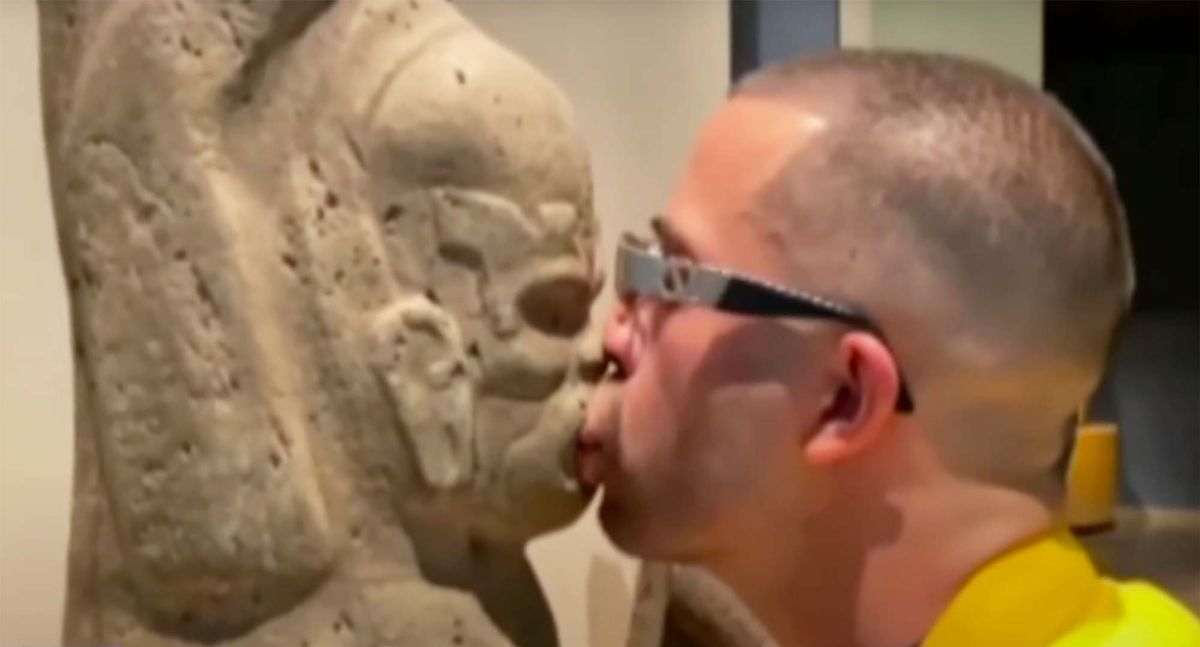It all started with a kiss.
A Mexican artist has gone on a smooching spree targeting objects at the Museo Nacional de Antropología in Mexico City in a bid to draw attention to the pillaging of the country’s ancient artefacts.
In videos posted online, Durango native Pepx Romero can be seen licking approximately 30 works spread across five themed rooms at the institution devoted to the Gulf, Mexica, Teotihuacán, Toltec and Oaxaca periods.
“It’s a provocation to attract attention to this situation that is happening in the auctions [of pre-Hispanic artefacts],” he says in voice-over accompanying one of the videos. “There have been auctions this year and they haven’t been able to be stopped. French laws allow this disgrace […] they’re prostituting our heritage in front of our noses.”
Romero, who works as a theatre director and founder of a music collective, says that the looting of Mexico’s ancient Indigneous culture is a major problem, but auction houses in Europe are not paying enough attention to it.
Just last month, Mexico’s attorney general’s office seized 14 Teotihuacan artefacts that were set to be sent from a Tijuana post office. In a bid to stop these and other forms of illegal excavation and looting, the Mexican government launched a campaign last October called “Mi Patrimonio No Se Vende” (“My Heritage Is Not For Sale”), which it says aims to reclaim objects believed to have been exported under suspicious circumstances.
Despite contacting a number of auction houses, including Christie’s, the Mexican government and the Instituto Nacional de Antropología e Historia (INAH) have so far seen only a handful of objects pulled from sales and repatriated in recent years, prompting Romero to commence his licking spree late last month.
In one of the videos, he is seen entering the museum with three others who keep watch for museum security. Dressed in a yellow suit and sunglasses, he seductively faces up to a mud head, moving his tongue several times over the facial features carved by one of Mexico’s oldest ancestral cultures.
The museum is home to several objects dating to as far back as Mayan era, around 1,800 BCE, a civilisation that crisscrossed not only Mexico, but also Belize and Guatemala, which was then one of the most advanced civilisations on Earth, producing ornate architectural elements and detailed statues and representations.
Diego Prieto, the director of the INAH (which runs the museum), said in an interview with El Pais that no pieces were damaged during Romeo’s intimate action. He also defended the institution’s security measures despite the brazen breach.
“Approaching a [museum] piece at such a close distance is not correct, but it’s possible at any museum in the world,” Prieto said. “Fortunately in this case the approaches didn’t cause damage.”
Defending his actions, Romero says he is tired of seeing his country’s culture as “a decoration boutique for rich people”, adding that he believes he acted firmly within the boundaries of the law. “I believe that these laws protect assets from being damaged,” he notes. “However, the act [I carried out] didn’t cause damage. I’m completely relaxed.”


